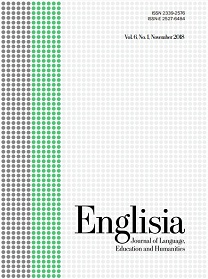Creative techniques for online learning assessment
DOI:
https://doi.org/10.22373/ej.v8i2.8111Keywords:
Creative Techniques, Online Learning, Assessment,Abstract
Online learning has been becoming a solution for schools, institutions, and universities that cannot run face-to-face learning. During the online learning process, there are challenges that stakeholders including teachers and lecturers often face. One of the challenges is in choosing assessment techniques which in this case is related to English learning assessment. Thus, the objective of this study is to elaborate some effective techniques for English learning assessment. Qualitative research was applied as a research design conducted at the English Education Department of the Institute for Islamic Studies of Padangsidimpuan. Ten lecturers of the English Department were chosen purposively as respondents and interview was used as a data collection technique. Then, data were analyzed through qualitative data analysis in which the data were described and elaborated in detailed ways. The findings revealed that there were many techniques that could be applied in English assessment methods. Among the methods are online tests using Google form application, discussion, and problem-solving, writing essays and summary, online presentation, multimedia presentation, mini-research, voice thread, storytelling, recording performance, online interview, and making content on social media. The study also unveiled that lecturers’ creativity is needed to create an objective and effective assessment for online learning.Downloads
References
Ali, A. (2003). Instructional design and online instruction: Practices and perception. TechTrends, 47(5), 42.
Bartlett, J. E., II, Reynolds, K. A., Alexander, M. W. (2000). A tool for online learning. Journal of Online Learning, 11(3 & 4), 22-24.
Byrd, B., & Lott, K. (2003). Evaluation in online courses. Business Education Forum, 58(1), 48-50.
Carnevale, D. (2001). Assessment takes center stage in online learning. The Chronicle of Higher Education, 47(31), pp. A43-A45
Christopher, M. M., Thomas, J. A., & Tallent-Runnels, M. K. (2004). Raising the bar: Encouraging high level thinking in online discussion forums. Roeper Review, 26(3), 166-171.
Cooper, L. W. (2001). A comparison of online and traditional computer application classes. T.H.E. Journal, 28(8), 52-58
Dixson, D. D., & Worrell, F. C. (2016). Formative and summative assessment in the classroom. Theory into Practice, 55(2), 153-159
Evans, C. D. (2002). Understanding assessment. The Delta Pi Epsilon Journal, 44(1), 3-12.
Gaytan et al, J. (2007). Effective Online Instructional and Assessment Strategies. The American Journal Of Distance Education, 2, 117–132. https://doi.org/10.1080/08923640701341653
Hasan et al., N. (2018). Internet and Increasing Issues of Plagiarism. ResearchGate, 5, 125–131.
Heberling, M. (2002). Maintaining academic integrity in online education. Online Journal of Distance Learning Administration, 5(1).
Henning, K. (2003). Writing: Shifting boundaries and the implications for college teaching. Teaching English in the Two Year College, 30(3), 306-316.
Kearns, L. R. (2012). Student Assessment in Online Learning: Challenges and Effective Practices. MERLOT Journal of Online Learning and Teaching, Vol. 8, No. 3, September 2012.
https://jolt.merlot.org/vol8no3/kearns_0912.pdf
Marriot, P. (2009). Students’ evaluation of the use of online summative assessment on an undergraduate financial accounting module. British Journal of Educational Technology, 4, 237-254.
MacKinnon, G. R. (2002). Practical advice for first time online instructors: A qualitative study. Journal of Instructional Delivery Systems, 16(1), 21-25.
Olt, M. R. (2002). Ethics and distance education: Strategies for minimizing academic dishonesty in online assessment. Online Journal of Distance Learning Administration, 5(3). Retrieved June 15, 2003 from http://www.westga.edu/~distance/ ojdla/fall53/olt53.html
Omar Al Hujran. (2013). Challenges to E-learning Success: The Student Perspective. International Conference on Information, Business and Education Technology, 1197–1205. https://doi.org/DOI: 10.2991/icibet.2013.226
Oncu, S., & Cakir, H. (2011). Research in online learning environments: Priorities and methodologies. Computers & Education, 57(1), 1098-1108. doi:10.1016/j.compedu.2010.12.009
Orlando, J. (2011). How to Effectively Assess Online Learning. Magna Publications, Inc, 37.
Rana, R. (2015). Financial Development and Economic Growth: Evidence from a Panel Study on South Asian Countries. Asian Economic and Financial Review, 5, 1159–1173.
https://doi.org/10.18488/journal.aefr/2015.5.10/102.10.1159.1173
Robles, M., & Braathen, S. (2002, Winter). Online Assessment Techniques. The Delta Pi Epsilon Journal, 44(1), 39-49.
Singh, P., & Pan, W. (2004). Online education: Lessons for administrators and instructors. College Student Journal, 38(2), 302.
Stevens, J. (2018). Finding the Balance: Creating Meaningful Assignments without Overwhelming Instructional Workload. Journal of Educators Online, 15(3).
Swan, J. K. G. (2017). The Challenges of Online Learning: Supporting and Engaging the Isolated Learner. Journal of Learning Design, 10, 20–30. https://doi.org/10.5204/jld.v9i3.293
Yang, Y. F., & Tsai, C.-C. (2010). Conceptions of and approaches to learning through online peer assessment. Learning and Instruction, 20(1), 72-83. doi:10.1016/j.learninstruc.2009.01.003
Yeo, C. H., Ke, K., & Chatterjee, B. (2014). An investigation into the relationship between online formative assessments and performance of students. e-Journal of Business Education and Scholarship of Teaching, 8(1), 18-21.
Zacharis, N. Z. (2009). Fostering Students’ Participation In Online Environments: Focus On Interaction, Communication And Problem Solving. Journal of College Teaching & Learning, 6, 25–34.
Downloads
Published
Issue
Section
License
Proposed Policy for Journals That Offer Open Access
Authors who publish with Englisia journal agree to the following terms:
- Authors retain copyright and grant the journal right of first publication with the work simultaneously licensed under a Creative Commons Attribution License that allows others to share the work with an acknowledgement of the work's authorship and initial publication in this journal.
- Authors are able to enter into separate, additional contractual arrangements for the non-exclusive distribution of the journal's published version of the work (e.g., post it to an institutional repository or publish it in a book), with an acknowledgement of its initial publication in this journal.
- Authors are permitted and encouraged to post their work online (e.g., in institutional repositories or on their website) prior to and during the submission process, as it can lead to productive exchanges, as well as earlier and greater citation of published work (See The Effect of Open Access).









